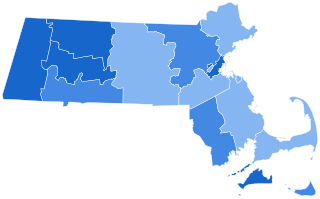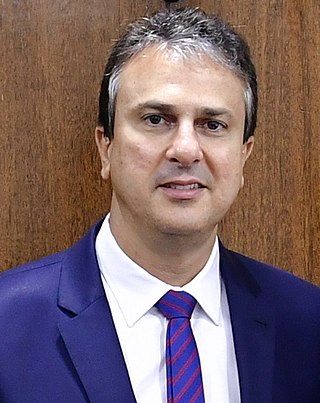
Brazil elects on the national level a head of state — the president — and a legislature. The president is elected to a four-year term by absolute majority vote through a two-round system. The National Congress has two chambers. The Chamber of Deputies has 513 members, elected to a four-year term by proportional representation. The Federal Senate has 81 members, elected to an eight-year term, with elections every four years for alternatively one-third and two-thirds of the seats. Brazil has a multi-party system, with such numerous parties that often no one party has a chance of gaining power alone, and so they must work with each other to form coalition governments.
Agir is a political party in Brazil, established in 1985. It was founded as the Youth Party, and was renamed the National Reconstruction Party in 1989, and the Christian Labor Party in 2000. The party was renamed Agir in 2021, a change ratified by the Superior Electoral Court the following year.

Podemos, previously known as the National Labour Party is a centre-right Brazilian political party. Historically labourist and Janist, since 2016 the party shifted its focus to support anti-corruption policies and direct democracy.

The 2008 United States presidential election in Massachusetts took place, as in all 50 states and D.C., as part of the 2008 United States presidential election of November 4, 2008. Voters chose 12 representatives, or electors to the Electoral College, who, in turn, voted for the office of president and vice president.

The 2008 United States presidential election in Wisconsin took place on November 4, 2008, as part of the 2008 United States presidential election in which all 50 states plus the District of Columbia participated. State voters chose 10 electors to represent them in the Electoral College via a popular vote pitting Democratic U.S. Senator from Illinois Barack Obama, and his running mate U.S. Senator from Delaware Joe Biden, against Republican challenger and U.S. Senator from Arizona John McCain and his running mate, Alaska Governor Sarah Palin.

From January 3 to June 5, 2012, voters of the Democratic Party chose its nominee for president in the 2012 United States presidential election. President Barack Obama won the Democratic Party nomination by securing more than the required 2,383 delegates on April 3, 2012, after a series of primary elections and caucuses. He was formally nominated by the 2012 Democratic National Convention on September 5, 2012, in Charlotte, North Carolina.

The 2008 United States presidential election in the District of Columbia took place on November 4, 2008, and was part of the 2008 United States presidential election. In D.C., voters chose three representatives, or electors to the Electoral College, who voted for president and vice president. Prior to the election, the nation's capital was considered to be a certain lock for Obama. Washington D.C. is fiercely Democratic and has voted for the Democratic candidate in every presidential election by large margins since 1964 when the District gained the right to electoral representation through the 23rd amendment.

The 2008 United States presidential election in Connecticut took place on November 4, 2008, and was part of the 2008 United States presidential election. Voters chose seven representatives, or electors to the Electoral College, who voted for president and vice president.

The 2008 United States presidential election in Delaware took place on November 4, 2008, and was part of the 2008 United States presidential election. Voters chose three representatives, or electors to the Electoral College, who voted for president and vice president.

The 2008 United States presidential election in Maryland took place on November 4, 2008, and was part of the 2008 United States presidential election. Voters chose 10 representatives, or electors to the Electoral College, who voted for president and vice president.

The Brazilian Labour Party was a political party in Brazil registered in 1981. It was the seventh largest political party in Brazil with more than a million affiliated as of 2022.

The 2012 United States presidential election in Iowa took place on November 6, 2012, as part of the 2012 United States presidential election in which all 50 states plus the District of Columbia participated. Iowa voters chose six electors to represent them in the Electoral College via a popular vote pitting incumbent Democratic President Barack Obama and his running mate, Vice President Joe Biden, against Republican challenger and former Massachusetts Governor Mitt Romney and his running mate, Congressman Paul Ryan.

The 2012 United States presidential election in New Jersey took place on November 6, 2012, as part of the 2012 United States presidential election in which all 50 states plus the District of Columbia participated. Voters in the state chose 14 electors to represent them in the Electoral College via a popular vote pitting incumbent Democratic President Barack Obama and his running mate, Vice President Joe Biden, against Republican challenger and former Massachusetts Governor Mitt Romney and his running mate, Congressman Paul Ryan.
Patriota, abbreviated PATRI and formerly known as the National Ecological Party, was a right-wing to far-right political party in Brazil. It was registered in the Superior Electoral Court in the summer of 2012. The last president of the party was the former State Deputy of São Paulo Adilson Barroso, who before creating PEN was a member of the Social Christian Party. The party's Superior Electoral Court identification number was 51.

Electronic voting was first introduced to Brazil in 1996, with the first tests carried out in the state of Santa Catarina. The primary design goal of the voting machine is extreme simplicity, the model being a public phone booth. The voting machines perform three steps – voter identification, secure voting, and tallying – in a single process, aiming to eliminate fraud based on forged or falsified public documents. Political parties have access to the voting machine's programs before the election for auditing.

The Brazilian municipal elections of 2016 took place on 2 October 2016 and on 30 October 2016. Electors chose mayors, vice-mayors and city councillors of all 5,568 cities of the country. The partisan conventions took place between 20 July and 5 August. The party political broadcast started on 26 August and ended on 29 September. Until 2012, on Mondays, Wednesdays and Fridays there was the broadcast for candidates to city halls, 30 minutes long. The broadcasts for candidates for city councils were broadcast on Tuesdays, Thursdays and Saturdays, also 30 minutes long. At least 97 cities had only one candidate for mayor in these elections. Besides that, 48.8% of the cities of the country didn't have more than two candidates. These were the first elections in which recently registered parties Partido da Mulher Brasileira (PMB), Rede Sustentabilidade (REDE) and Partido Novo (NOVO) participated; they were recognized by the Superior Electoral Court in 2015. Some of the most highlighted elected candidates include liberal businessman João Doria (PSDB) in São Paulo and licensed bishop Marcelo Crivella (PRB) in Rio de Janeiro. The elections also took place after the impeachment of Dilma Rousseff and during the investigations of Operation Car Wash. However, it only affected the left-wing Workers' Party, with its reduction of elected mayors, while the centre-right Brazilian Democratic Movement Party and Progressive Party, with the most of its members investigated, had an increase of elected candidates.

The 2018 Ceará state election was held on October 7, 2018 as part of the general elections in Brazil. Those from Ceará eligible to vote elected their representatives in the following proportion: 22 federal deputies, 2 senators, and 46 state deputies.

Municipal elections took place in Brazil on 15 November 2020. Electors chose Mayors, Vice-Mayors and City Councillors of all 5,568 cities of the country. The partisan conventions took place between 31 August and 16 September. They were the first elections since Bolsonaro's election as President.

Popular Unity, also known as Popular Unity for Socialism, is a Brazilian political party founded on 16 June 2016, which had its right to launch candidacies recognized by the Superior Electoral Court (TSE) on 10 December 2019. As a socialist party, it is connected to homeless workers' movements and defends the nationalization of the banking system, social control of all monopolies, capitalist consortia, and the means of production at-large, as well as rural land reform and collectivization.

The electoral system of Brazil is the set of means used to choose representatives and government members of the Federative Republic of Brazil. The current system is defined by the 1988 Constitution and the Electoral Code, in addition to being regulated by the Superior Electoral Court as delegated by law. The Constitution itself already defines three distinct electoral systems, which are detailed in the Electoral Code: proportional elections for the Chamber of Deputies, mirrored in the legislative powers at the state and municipal levels, majority elections with one or two elected representatives to the Federal Senate and majority elections in two rounds for president and other executive heads in other spheres.



















